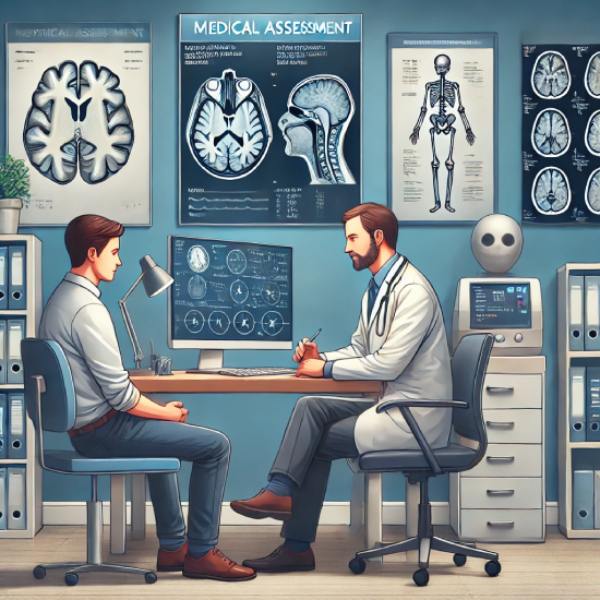
Alcohol Withdrawal Syndrome (AWS) is a serious medical condition that occurs when individuals who are physically dependent on alcohol abruptly reduce or stop their intake. Its symptoms can range from mild anxiety and tremors to severe complications like seizures and delirium tremens, which can be life-threatening without proper medical intervention. As our understanding of alcohol withdrawal deepens in 2025, new approaches are emerging alongside gold-standard therapies, offering improved outcomes and safer, more personalized care. This guide provides a comprehensive overview of AWS, from causes and risk factors to proven treatments, cutting-edge innovations, and essential advice for patients and families.
Table of Contents
- Exploring Alcohol Withdrawal Syndrome: Roots, Symptoms, and Occurrence
- Current and Next-Generation Treatment Modalities
- Emerging Technologies and Novel Interventions in Withdrawal Care
- Clinical Research Findings and Success Indicators
- Frequently Asked Questions
Exploring Alcohol Withdrawal Syndrome: Roots, Symptoms, and Occurrence
Understanding Alcohol Withdrawal Syndrome
Alcohol Withdrawal Syndrome (AWS) arises when a person who has developed physical dependence on alcohol suddenly reduces or discontinues drinking. The central nervous system, long accustomed to the presence of alcohol, reacts strongly to its absence, producing a range of symptoms that may escalate quickly and require urgent intervention.
Diagnostic Criteria and Clinical Features
The DSM-5 and ICD-11 outline AWS as the appearance of two or more of the following symptoms within hours to a few days after stopping or reducing alcohol use:
- Autonomic hyperactivity (sweating, rapid pulse)
- Hand tremor
- Insomnia
- Nausea or vomiting
- Hallucinations or illusions
- Psychomotor agitation
- Anxiety
- Grand mal seizures
Delirium tremens (DTs) is the most severe form, characterized by confusion, agitation, fever, hallucinations, and life-threatening autonomic instability.
Prevalence and Risk Groups
- Approximately 50% of individuals with alcohol dependence will experience withdrawal symptoms upon cessation.
- About 3–5% develop severe complications, such as seizures or DTs.
- Those with a history of heavy, prolonged drinking, prior withdrawal episodes, older age, or coexisting medical problems face higher risks.
Causes and Contributing Factors
Neurobiological Mechanisms
- Chronic alcohol use enhances inhibitory neurotransmitter GABA and suppresses excitatory glutamate receptors in the brain.
- When alcohol is stopped, this balance is disrupted, leading to excessive neuronal activity and withdrawal symptoms.
Genetic and Environmental Influences
- Family history of substance use, underlying psychiatric disorders, chronic stress, and lack of social support increase the risk of dependence and severe withdrawal.
Medical and Social Context
- Co-existing illnesses, poor nutrition, homelessness, and lack of access to healthcare worsen outcomes and complicate management.
Health Impacts of Untreated Withdrawal
- Cardiac arrhythmias, aspiration pneumonia, dehydration, and multi-organ failure can result if withdrawal is unmanaged.
- Untreated severe AWS carries a significant mortality risk.
Societal and Economic Costs
- Repeated hospitalizations and emergency care strain healthcare resources.
- Family disruption, job loss, and legal issues frequently follow severe AWS episodes.
Practical Advice:
If you or someone you know is considering quitting alcohol after regular, heavy use, seek medical guidance before stopping suddenly. Early intervention can prevent life-threatening complications.
Current and Next-Generation Treatment Modalities
Initial Assessment and Risk Stratification
Effective treatment of AWS begins with a thorough assessment:
- History of alcohol consumption and prior withdrawal episodes
- Physical exam and vital signs
- Laboratory workup: electrolytes, liver/kidney function, glucose
- Assessment tools: CIWA-Ar (Clinical Institute Withdrawal Assessment for Alcohol, Revised) to measure severity
Standard Medical Management
1. Benzodiazepines
- Remain the cornerstone for moderate to severe withdrawal.
- Medications like diazepam, chlordiazepoxide, or lorazepam are titrated to symptoms.
- Symptom-triggered dosing reduces risks of overmedication and shortens hospital stays.
2. Supportive Care
- Rehydration, electrolyte replacement, and nutritional support
- Thiamine and multivitamin supplementation to prevent Wernicke-Korsakoff syndrome
3. Monitoring and Safety
- Close observation in a hospital or detox unit for severe cases
- Continuous monitoring of vital signs and mental status
Adjunctive and Alternative Medications
- Anticonvulsants (carbamazepine, valproate): For mild withdrawal or those at risk for benzodiazepine misuse
- Beta-blockers, clonidine, or gabapentin: Used to manage specific symptoms or co-occurring conditions
- Antipsychotics: Reserved for severe agitation or hallucinations, used with caution
Addressing Co-Occurring Disorders
- Integrated treatment of anxiety, depression, or other psychiatric conditions is essential for lasting recovery.
- Referral for ongoing addiction counseling and support.
Emerging and Personalized Care Models
- Outpatient detox programs for low-risk patients with strong support systems
- Hospital-at-home models, leveraging telehealth and remote monitoring for safe withdrawal in familiar settings
- Culturally tailored programs for specific populations
Practical Advice:
Never attempt detox alone or “cold turkey” after heavy drinking—serious symptoms can escalate quickly. Medical supervision, tailored to your risk, is essential for safe recovery.
Emerging Technologies and Novel Interventions in Withdrawal Care
Digital Monitoring and Telemedicine
- Remote CIWA-Ar assessments: Video and app-based symptom tracking to enable daily clinical supervision at home
- Telehealth check-ins: Quick access to addiction specialists, therapists, and medical teams
- Mobile health apps: Medication reminders, hydration/nutrition trackers, and supportive chatbots
Wearable Devices
- Smartwatches and biosensors can track heart rate, sleep, and autonomic symptoms in real time.
- Early detection of worsening withdrawal or medical complications prompts timely intervention.
AI and Predictive Analytics
- Algorithms predict risk of severe withdrawal based on patient history and current symptoms, guiding the level of care needed.
- Automated alerts notify care teams of dangerous trends in vital signs or reported symptoms.
Pharmacological Innovation
- Development of new medications that target underlying neurochemical pathways, aiming to reduce withdrawal symptoms without dependence risks associated with benzodiazepines.
- Extended-release formulations of anticonvulsants or anxiolytics for sustained symptom control.
Virtual Support Communities
- Peer support forums and 24/7 moderated chatrooms for individuals and families experiencing withdrawal
- Integration of digital peer coaching into formal treatment programs
Integrated Care Platforms
- Combining physical, psychological, and social support into single platforms, ensuring continuity from detox through long-term recovery
Practical Advice:
Utilize digital resources and telemedicine if in-person care is inaccessible. Consistent support and monitoring—whether virtual or face-to-face—can significantly improve outcomes.
Clinical Research Findings and Success Indicators
Evidence from Clinical Trials and Meta-Analyses
- Benzodiazepines consistently reduce severity and complications of AWS in controlled studies.
- Symptom-triggered regimens using CIWA-Ar scores result in less medication use and faster recovery.
- Anticonvulsants are effective alternatives for select patients, especially in outpatient settings.
- Telemedicine and remote monitoring, accelerated by the COVID-19 pandemic, have demonstrated non-inferior outcomes for many mild to moderate withdrawal cases.
Outcome Metrics
Symptom Relief and Stabilization
- Rapid resolution of tremors, agitation, and vital sign abnormalities
- Prevention of seizures and delirium tremens
Safety and Patient Satisfaction
- Reduction in adverse effects and complications
- Improved comfort and engagement during withdrawal
Long-Term Recovery
- Transition to ongoing addiction treatment and relapse prevention
- Tracking quality of life, abstinence rates, and re-hospitalization
Patient-Reported Outcomes
- Self-assessment of cravings, anxiety, and overall well-being
- Feedback on support, digital resources, and care team accessibility
Biomarkers and Predictors
- Blood markers of liver and metabolic health, used to monitor recovery
- Digital logs and wearables to track behavioral and physiologic trends over time
Practical Advice:
Success in AWS treatment is more than just symptom control—it means setting the foundation for sustained sobriety. Choose programs with strong aftercare, peer support, and accessible resources.
Frequently Asked Questions
What are the first signs of alcohol withdrawal syndrome?
Early signs include anxiety, tremors, sweating, irritability, rapid heartbeat, and nausea—often starting within 6–12 hours after the last drink.
How long does alcohol withdrawal usually last?
Mild to moderate symptoms typically peak within 24–72 hours and resolve in 5–7 days. Severe cases, like delirium tremens, may last longer and require hospitalization.
Is alcohol withdrawal syndrome dangerous?
Yes. Severe withdrawal can cause seizures, confusion, heart complications, and can be life-threatening. Medical supervision is crucial for safety.
What is the safest way to detox from alcohol?
Medically supervised detox, using tailored medications and supportive care, is the safest approach. Never attempt withdrawal alone after heavy drinking.
Are there new treatments for alcohol withdrawal in 2025?
In addition to standard medications, digital monitoring, telehealth, and new pharmacological options are enhancing safety and improving outcomes in withdrawal management.
Can alcohol withdrawal syndrome be prevented?
Gradual reduction under medical supervision and early intervention can prevent severe symptoms in some cases. Proactive planning is essential for those at risk.
What happens after withdrawal is complete?
Transition to ongoing addiction treatment, counseling, and peer support is vital to sustain sobriety and address underlying triggers for drinking.
Disclaimer:
This article is for educational purposes only and should not be considered a substitute for professional medical advice. Always consult a qualified healthcare provider regarding any medical concerns or treatment decisions.
If you found this guide useful, please consider sharing it on Facebook, X (Twitter), or your preferred social media platform. Your support helps us continue delivering reliable, high-quality content to those in need!










